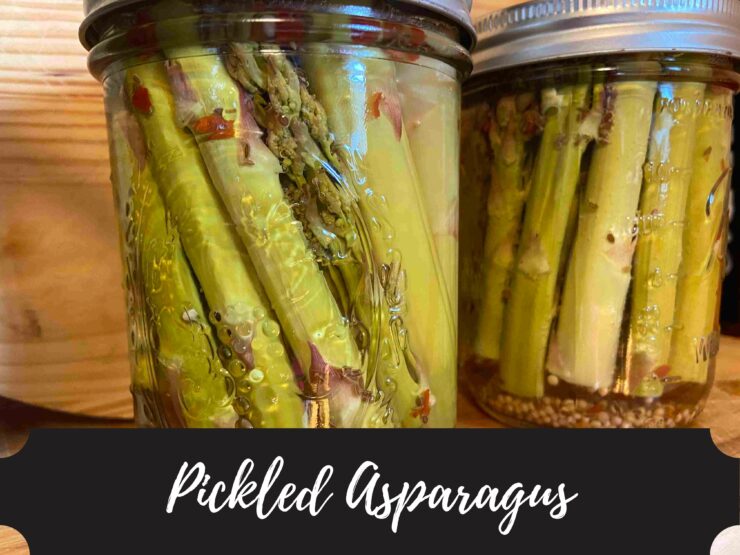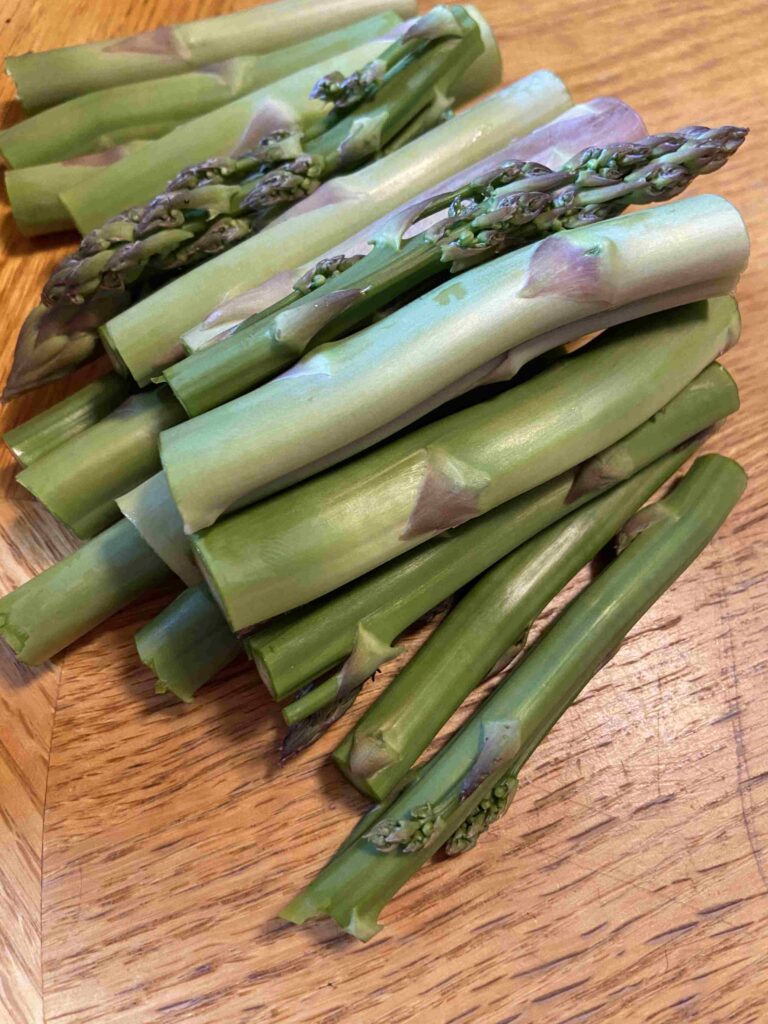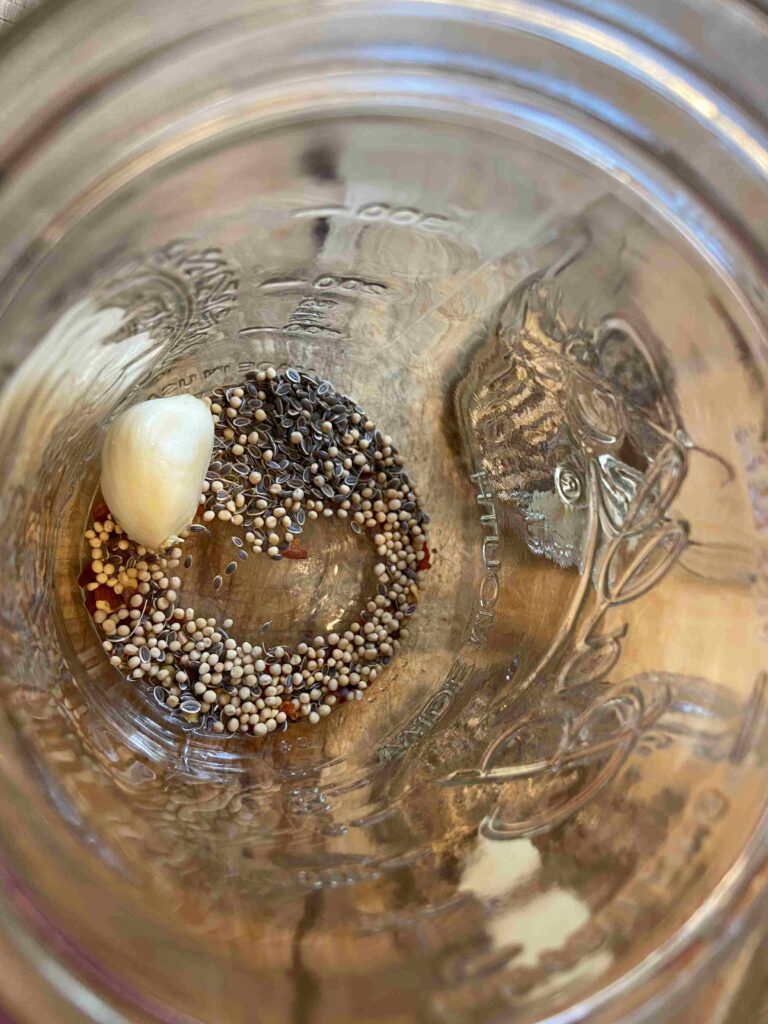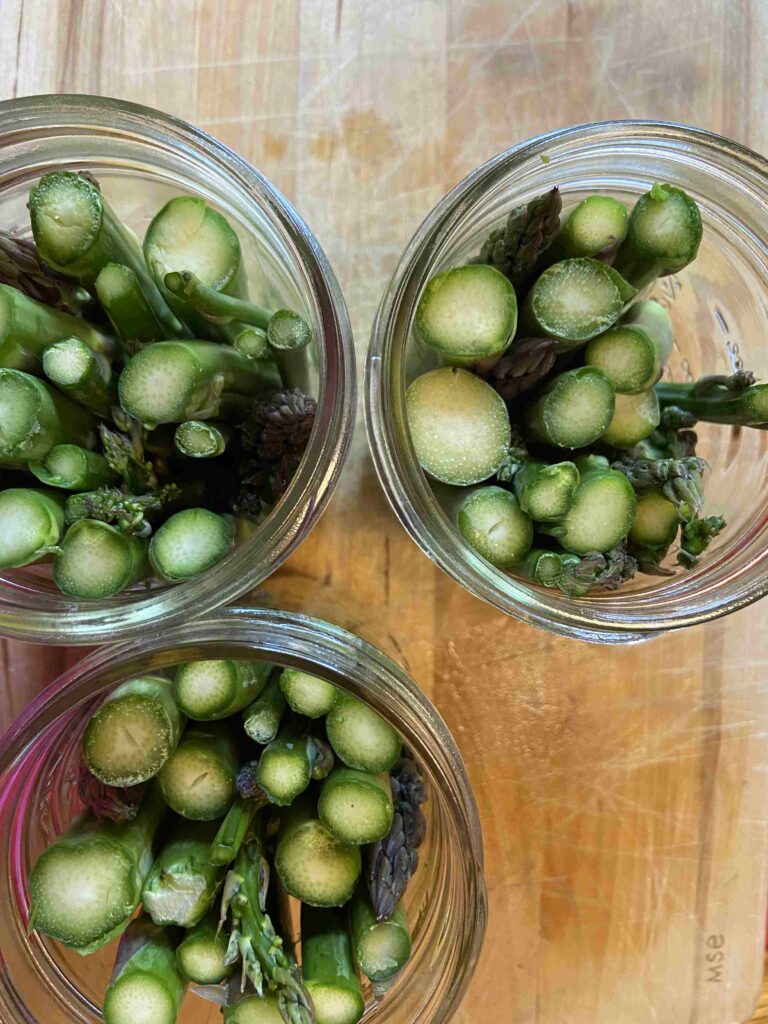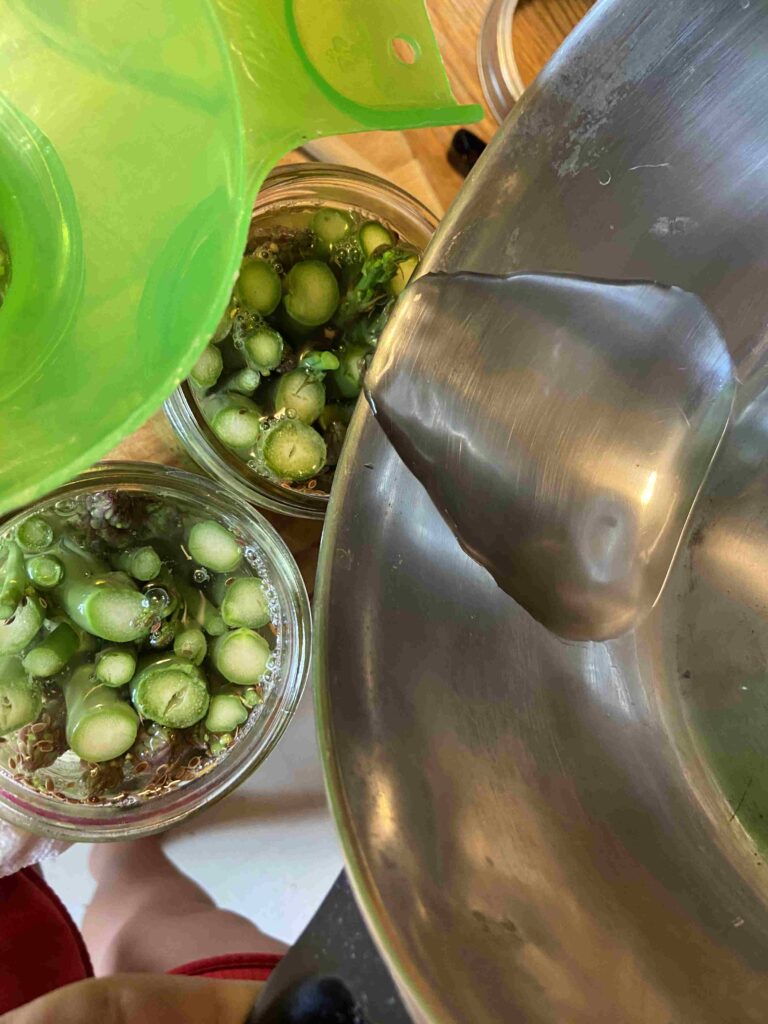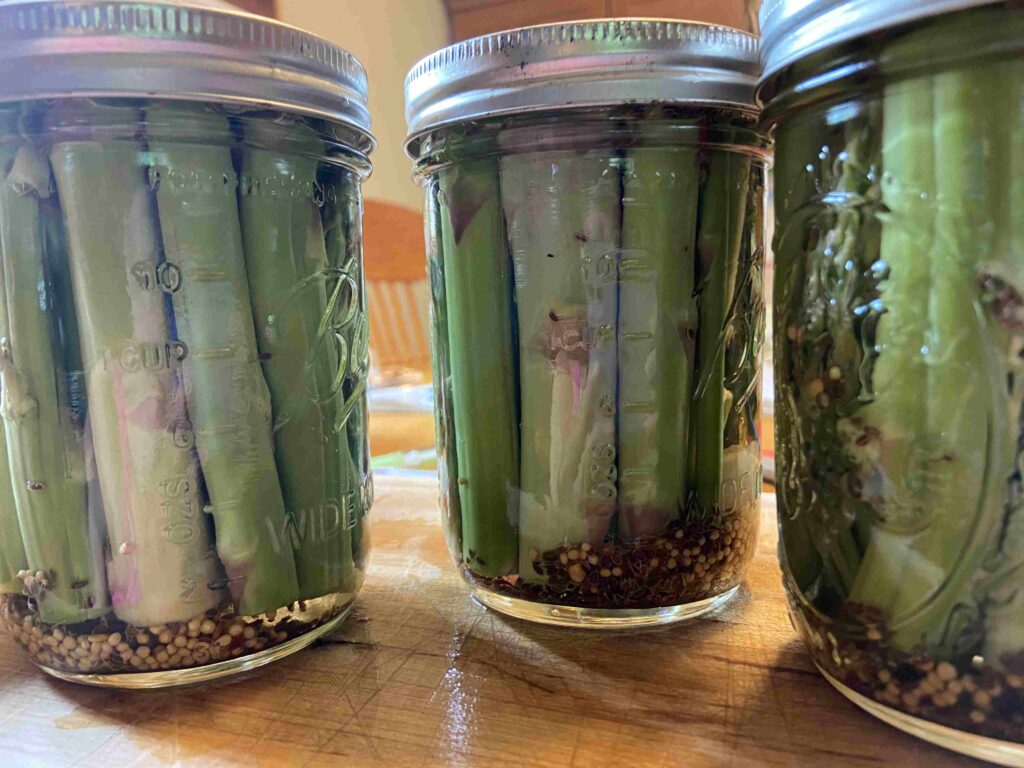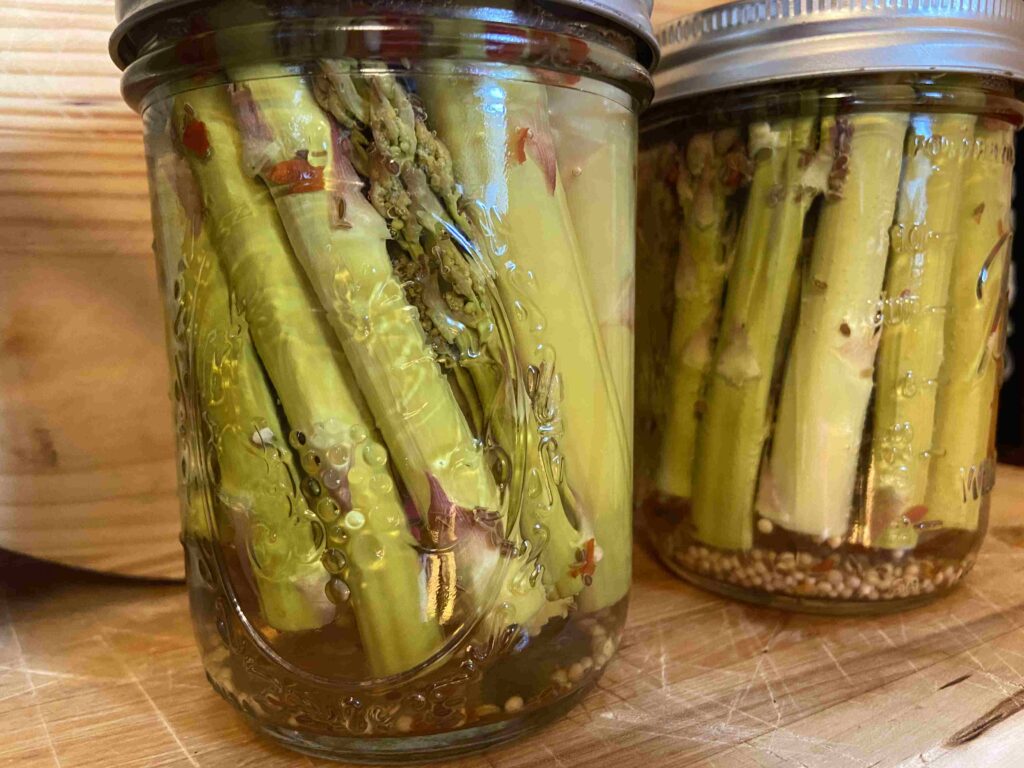Here in Wisconsin, we are finally entering the full swing of gardening season. The seeds are sprouting, plants are in the ground, and the spring plants are ready for harvest. At our home, that means we have rhubarb, winter onions, and asparagus all around us. My husband and I love asparagus. Our kids, not so much. Generally, I am not the mom that avoids foods because her kids don’t like them (“suck it up buttercup”), but my son REALLY doesn’t like it even after we’ve made him try it countless times. Because of this, we have an abundance of it that isn’t being eaten during meals. So of course, I got my water bath canner out and put together some pickled asparagus.
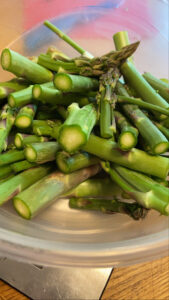
Since there isn’t a ton of other vegetables to be harvested out of the garden yet, I tend to forget to harvest the asparagus. My husband and I walk around the garden every morning with our coffee. And almost every morning I say, “OH! I must harvest the asparagus today!” If you know me, you won’t be surprised that it is out of my head by the time we get back inside and I am back to saying, “OH! I must harvest the asparagus today!” the next day.
Why am I telling you this? Well, this factoid actually worked in my favor. I ended up with longer stalks than normal, but they made for perfect pickled asparagus. I could cut them into the exact length for a pint jar without wasting too much. So excited for that! And although I am not a Bloody Mary lover (gosh, I wish I were), I know that pickled asparagus is almost a quintessential accompaniment to the Sunday morning drink.
Don’t have a garden to harvest asparagus from? Hop on over to your local farmer’s market, support local farmers, and make yourself something delicious you can enjoy, with or without a Bloody Mary underneath it.
For this recipe, I had a 1 ½ pounds of asparagus, which was the ideal amount to make three pint jars. That is, you can assume you’ll get one pint jar per half pound of asparagus. The recipe will be written “per jar” so you can make as little or as much as you desire!
New to canning?
The Ball’s Blue Book Guide to Preserving has been my go to resource for the past 4 years or so. But they also have a few other great books you can get on Amazon:
- The All New Ball Book of Canning and Preserving
- Ball Complete Book of Home Preserving
- The National Center for Home Food Preservation also had great, detailed information online
Your ingredients (per pint jar):
- ½ cup water
- ½ cup vinegar
- 1 tablespoon canning salt
- ½ pound asparagus, cleaned and the woody stem broken off
- ½ teaspoon dill seed
- 1 clove garlic, peeled
- ⅛ teaspoon red pepper flakes
- ½ teaspoon mustard seed
Your Steps
To begin, prepare your water bath canner. Fill the canner with enough water so that once the jars are in the canner, they will be covered by at least one inch of water. Too much water is better than not enough, but remember that some water will be displaced by the jars. Begin to heat over a medium-high heat.
Prepare jars, rings, and lids by washing with soapy water and keeping warm. Cut asparagus to length that will fit within the pint jars, ending just before the ring. I like to cut one spear to length and then use that spear as a “measuring spear” for the rest of the asparagus.
Combine salt, water, and vinegar in a large non-reactive saucepan. Heat to a boil and then reduce to a simmer.
While the pickling liquid is heating, pack the jars (they should be hot when you pack them). First, add dill seed, garlic clove, red pepper flakes, and mustard seed. Then add asparagus, leaving ½ inch head space. Ladle pickling liquid over asparagus, leaving ½ inch head space. Remove air bubbles. Wipe the jar rim with a damp paper towel. Place lids and rings on jars, tightening to finger-tip tight.
Place jars on rack in canner, lower into simmering water, cover, and bring to a rolling boil. Process jars for 15 minutes. Remove from heat and allow to cool 5 additional minutes. Remove the jars from the canner and leave to cool completely over 12-24 hours. Do not touch the lids or the rings, but definitely listen for the ping of the jars sealing. It’s the best!

Cleaned and cut to the perfect length. 
Get those spices in there. 
Pack the jars. Isn’t this beautiful? 
Last of the pickling liquid. 
A quick picture before they enter the canner. 
Complete!
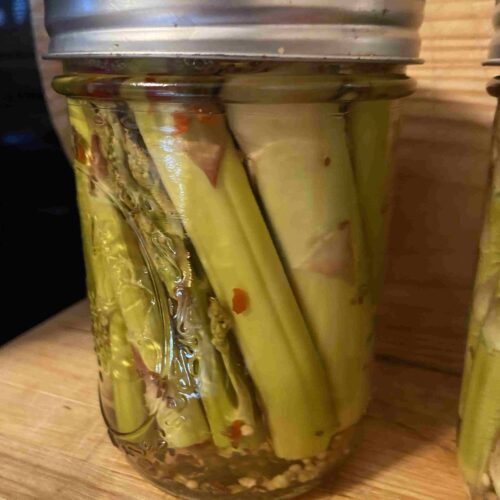
Pickled Asparagus
Ingredients
- ½ cup water
- ½ cup vinegar
- 1 tablespoon canning salt
- ½ pound asparagus cleaned and the woody stem broken off
- ½ teaspoon dill seed
- 1 clove garlic peeled
- ⅛ teaspoon red pepper flakes
- ½ teaspoon mustard seed
Instructions
- To begin, prepare your water bath canner. Fill the canner with enough water so that once the jars are in the canner, they will be covered by at least one inch of water. Too much water is better than not enough, but remember that some water will be displaced by the jars. Begin to heat over a medium-high heat.
- Prepare jars, rings, and lids by washing with soapy water and keeping warm. Cut asparagus to length that will fit within the pint jars, ending just before the ring. I like to cut one spear to length and then use that spear as a “measuring spear” for the rest of the asparagus.
- Combine salt, water, and vinegar in a large non-reactive saucepan. Heat to a boil and then reduce to a simmer.
- While the pickling liquid is heating, pack the jars (they should be hot when you pack them). First, add dill seed, garlic clove, red pepper flakes, and mustard seed. Then add asparagus, leaving ½ inch head space. Ladle pickling liquid over asparagus, leaving ½ inch head space. Remove air bubbles. Wipe the jar rim with a damp paper towel. Place lids and rings on jars, tightening to finger-tip tight.
- Place jars on rack in canner, lower into simmering water, cover, and bring to a rolling boil. Process jars for 15 minutes. Remove from heat and allow to cool 5 additional minutes. Remove the jars from the canner and leave to cool completely over 12-24 hours.
Looking for more canning recipes? Check out this page here!
Notes:
- You can add pickle crisp to each jar (following directions on the container) to keep the asparagus more crisp. Some swear by it. Others don’t like the idea of adding more ingredients to your jars.
- Canning is totally doable alone, but I love to have my husband by my side during “GO TIME!” That is, the time when I am ladling the pickling liquid and putting on the lids. It’s helpful to have a second set of hands to put the lids and rings on. In case you’re wondering, I do actually yell, “IT’S GO TIME!” and my family assembles. Otherwise, canning is my jam and I don’t let him help 😉
- When I say break off the woody stem of the asparagus, I really mean that. The awesome thing about asparagus is that if you bend it slightly, it will naturally break at the point where it begins to be woody (NOT fun for chewing). In the past, I thought the canning process would soften this up so I wouldn’t be wasting it. Not the case.

